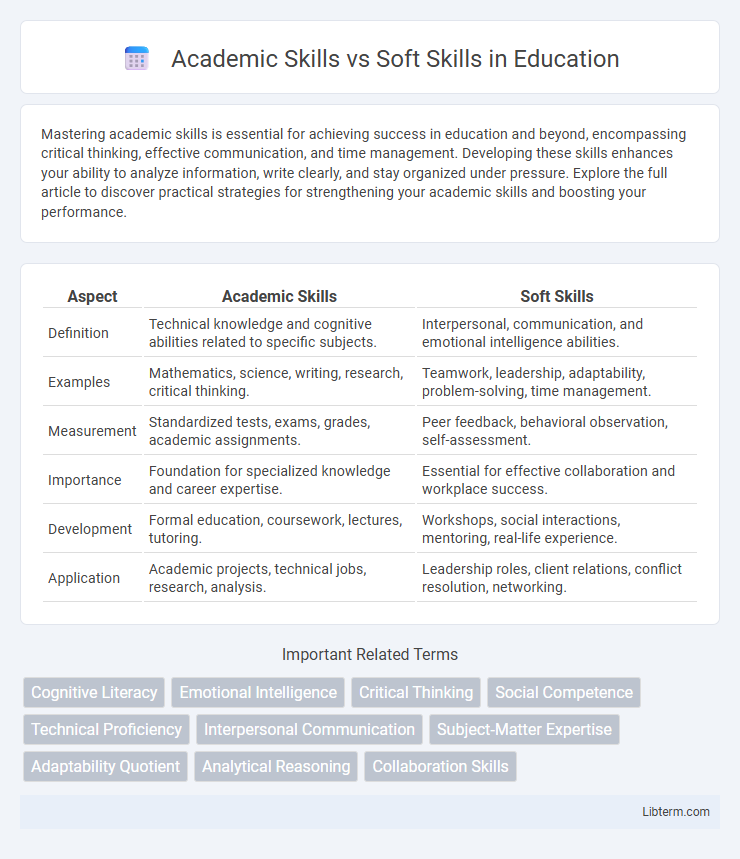Mastering academic skills is essential for achieving success in education and beyond, encompassing critical thinking, effective communication, and time management. Developing these skills enhances your ability to analyze information, write clearly, and stay organized under pressure. Explore the full article to discover practical strategies for strengthening your academic skills and boosting your performance.
Table of Comparison
| Aspect | Academic Skills | Soft Skills |
|---|---|---|
| Definition | Technical knowledge and cognitive abilities related to specific subjects. | Interpersonal, communication, and emotional intelligence abilities. |
| Examples | Mathematics, science, writing, research, critical thinking. | Teamwork, leadership, adaptability, problem-solving, time management. |
| Measurement | Standardized tests, exams, grades, academic assignments. | Peer feedback, behavioral observation, self-assessment. |
| Importance | Foundation for specialized knowledge and career expertise. | Essential for effective collaboration and workplace success. |
| Development | Formal education, coursework, lectures, tutoring. | Workshops, social interactions, mentoring, real-life experience. |
| Application | Academic projects, technical jobs, research, analysis. | Leadership roles, client relations, conflict resolution, networking. |
Introduction to Academic Skills and Soft Skills
Academic skills encompass critical thinking, research proficiency, and effective communication essential for mastering subject matter and excelling in educational environments. Soft skills include emotional intelligence, teamwork, adaptability, and problem-solving abilities crucial for personal development and professional success. Developing a balance of academic and soft skills enhances learning outcomes and prepares individuals for dynamic real-world challenges.
Defining Academic Skills
Academic skills encompass fundamental abilities such as critical thinking, research proficiency, effective communication, and quantitative analysis, essential for success in educational environments. These skills enable students to comprehend complex concepts, structure arguments, and engage in scholarly discourse across disciplines. Mastery of academic skills forms the foundation for lifelong learning and academic achievement.
Understanding Soft Skills
Soft skills encompass interpersonal abilities such as communication, teamwork, adaptability, and emotional intelligence that enhance personal interactions and workplace dynamics. Unlike academic skills, which are knowledge-based and measurable through tests, soft skills are often intangible yet crucial for effective collaboration and problem-solving. Mastery of soft skills leads to improved leadership, conflict resolution, and the ability to navigate complex social environments in professional settings.
Key Differences Between Academic and Soft Skills
Academic skills primarily involve technical knowledge and cognitive abilities required for formal education, such as reading comprehension, mathematical reasoning, and research techniques. Soft skills encompass interpersonal and emotional capabilities including communication, teamwork, adaptability, and problem-solving, which are crucial for workplace success and personal development. The key difference lies in academic skills being measurable and subject-specific, while soft skills are behavioral traits essential for effective interaction and collaboration in diverse environments.
Importance of Academic Skills in Education
Academic skills form the foundation of effective learning by enhancing critical thinking, problem-solving, and subject-specific knowledge essential for academic success. Proficiency in academic skills such as reading comprehension, research methodologies, and analytical writing directly influences students' ability to absorb and apply information across various disciplines. Mastery of these skills fosters intellectual growth and prepares learners for advanced education and professional challenges.
The Role of Soft Skills in Personal Development
Soft skills, including communication, emotional intelligence, and adaptability, play a crucial role in personal development by enhancing interpersonal relationships and self-awareness. Unlike academic skills, which are often technical and knowledge-based, soft skills enable individuals to navigate social environments and manage stress effectively. Mastery of soft skills contributes to improved leadership, teamwork, and conflict resolution, fostering holistic growth beyond traditional education.
How Academic Skills Impact Career Success
Academic skills such as critical thinking, problem-solving, and subject-specific knowledge form the foundation for mastering complex tasks and adapting to evolving professional demands. Proficiency in these skills facilitates effective communication, research capabilities, and technical expertise, which are crucial for job performance and career advancement. Employers highly value academic skills because they directly correlate with an individual's ability to learn, analyze, and contribute meaningfully in specialized roles.
Soft Skills Employers Value Most
Employers highly value soft skills such as communication, teamwork, adaptability, and problem-solving, which enhance workplace collaboration and efficiency. Emotional intelligence and time management are essential for navigating challenges and meeting deadlines effectively. These interpersonal abilities often outweigh pure academic knowledge in determining job performance and career advancement.
Balancing Academic and Soft Skills for Holistic Growth
Balancing academic skills such as critical thinking, subject knowledge, and research abilities with soft skills like communication, teamwork, and emotional intelligence fosters holistic growth essential for personal and professional success. Developing both skill sets enhances problem-solving capacity, adaptability, and interpersonal relationships, which are highly valued in educational environments and modern workplaces alike. Integrating academic proficiency with soft skills leads to well-rounded individuals prepared to navigate complex challenges and collaborative settings effectively.
Strategies to Develop Both Academic and Soft Skills
Effective strategies to develop academic skills include setting specific goals, utilizing active learning techniques like summarization and self-testing, and seeking feedback from instructors to enhance understanding and retention. Building soft skills requires engaging in group projects, practicing communication through presentations and networking, and cultivating emotional intelligence by reflecting on interpersonal interactions. Integrating time management and adaptability exercises supports balanced growth in both academic proficiency and interpersonal effectiveness.
Academic Skills Infographic

 libterm.com
libterm.com